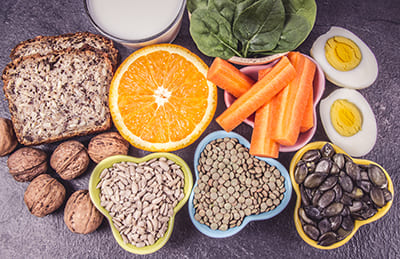Women and vitamins
Content:
- Vitamin requirements: What women really need
- What are the most important vitamins for women?
- Which women have an increased need for vitamins, minerals and trace elements?
- Which foods contain plenty of women's vitamins?
- Conclusion: Some vitamins are particularly important for women
Vitamin requirements: What women really need
Did you know that women havespecific needs for vitamins and other nutrients that change throughout their lives?[1] For example, adolescents have different vitamin needs than post-menopausal women, while pregnant and breastfeeding women require greater amounts of certain nutrients than non-pregnant women. General health and lifestyle can also influence female vitamin and mineral requirements. While a vitamin supplement is not necessary forall women , certain groups of people can ensure their intake of vitamins, minerals and trace elements by taking one.
In our guide you will learn what the most important vit amins for women are, who has an increased vitamin requirement and when a dietary supplement can be useful.
What are the most important vitamins for women?
The most important vitamins for women include:
- Antioxidants such as vitamins A, E and C.
- B vitamins such as vitamin B6, B12 and folic acid
- Vitamin D
- Vitamin K
Vitamins are divided into two groups: the water-soluble and the fat-soluble. The water-soluble vitamins consist of the eight B vitamins: B1 (thiamine), B2 (riboflavin), B3 (niacin), B5 (pantothenic acid), B6 (pyridoxine), B7 (biotin), B9 (folate) and B12 (cobalamin), as well as vitamin C.[2] Vitamins A, D, E and K are considered fat-soluble vitamins.
Water-soluble vitamins are not stored directly in the body and must be supplied continuously through the diet. Fat-soluble vitamins, on the other hand, are stored in body tissues and are retained for a longer period of time.[3]
- Enthält alle essenziellen Vitamine und besonders ausgewählte Mineralstoffe
- Individuell an den Bedarf von Frauen angepasst
- Vegan dank pflanzlicher Kapselhülle
Antioxidants

Among the important vitamins and minerals for women are the so-called antioxidants - especially vitamin A (in the forms of retinol, beta-carotene and carotenoids), vitamin C and vitamin E. They play a role in protecting against the so-called free radicals, which can destroy cells in the body.
- Vitamin C: You may also know vitamin C as ascorbic acid. It helps the body metabolize energy and reduce fatigue and tiredness. The vitamin acts as a powerful antioxidant and plays a role in immune function as well as in the production of collagen, which is necessary for healthy skin, for example.[4] Smoking and excessive alcohol consumption increase the risk of vitamin C deficiency.[5]
- Beta-carotene: Your body converts beta-carotene into vitamin A - a vitamin that supports vision, the immune system and the skin.[6] Women with the inborn error of metabolism cystic fibrosis and women in developing countries are at higher risk for vitamin A deficiency.[7]
- Vitamin E: Also known as tocopherol, this vitamin contains related compounds called tocotrienols. Your body needs the nutrient to keep cells healthy and protect them from oxidative stress.[8] Vitamin E deficiency is rare but can occur in women with conditions that cause fat malabsorption.[9]
B Vitamins

There are eight different B vitamins, all of which perform important functions in the body. However, vitamins B6, B12 and folic acid (vitamin B9) are particularly important for women.
- VitaminB6 : Vitamin B6 is also known as pyridoxine. It supports both your nervous system and your metabolism.[10] It ensures that you can efficiently convert your food into energy. The vitamin also has an important function for the immune system. Certain populations, such as women with obesity and autoimmune diseases, are more likely to have low levels of B6.[11]
- Vitamin B12: This vitamin is important for metabolism as well as the nervous system and helps the body make red blood cells.[12] Vitamin B12 deficiency can result from inadequate dietary intake or from conditions such as autoimmune diseases and malabsorption.[13]
- Folic acid: Folic acid has a function in cell division and contributes to the growth of maternal tissues during pregnancy Adults and children also need it to form normal red blood cells to prevent anemia.[14] The vitamin is especially important for pregnant women because it prevents birth defects such as spina bifida, a neural tube malformation in unborn children.[15] Folic acid deficiency can result from inadequate food intake, malabsorption, drug interactions, pregnancy, alcohol dependence and other factors.[16]
Vitamin D

Vitamin D is also an important vitamin for women. Although it is called a vitamin, it actually acts like a hormone. It helps calcium and phosphorus-important minerals for maintaining strong bones-enter the bloodstream.[17] When your body doesn't have enough vitamin D, it takes calcium and phosphorus away from your bones. Over time, this causes your bones to become thin and can lead to conditions like osteoporosis. In addition, vitamin D also supports the immune system and maintains calcium levels in the blood.[18]
Vitamin D deficiency is common: Women with obesity and older women are especially at higher risk.[19]
Vitamin K

Vitamin K is one of the important vitamins for the body. The nutrient not only plays an important role for women in maintaining bones and blood clotting[20], but an adequate supply of vitamin K is particularly essential for older people.
Vitamin K deficiency can occur in women with certain genetic disorders and can be caused by inadequate nutrition or the use of certain medications. Such vitamin deficiency may be manifested, for example, by increased bleeding from injury.[21]
Which women have an increased need for vitamins, minerals and trace elements?
A woman's vitamin needs change throughout her life. Deficiencies in nutrients are more common at certain stages of life, such as during pregnancy, and in certain circumstances, such as when a woman smokes or drinks excessively or when she has been diagnosed with a disease.
But women who play a lot of sports or have physically demanding jobs may also need to consume more nutrients to stay healthy.
Studies suggest that female athletes and women with active jobs, for example, are at higher risk for vitamin D and calcium deficiencies. Those who are very active may also be at higher risk for iron deficiency.[22]
Very physically active women can tailor their diet and supplement intake to their specific needs with a doctor or dietitian.
- Enthält alle essenziellen Vitamine und besonders ausgewählte Mineralstoffe
- Individuell an den Bedarf von Frauen angepasst
- Vegan dank pflanzlicher Kapselhülle
Do men and women need different vitamins?
Men need different amounts of vitamins than women. For example, menstruating women need higher intakes of iron and folic acid than men of the same age. Vitamin requirements for vitamins A, B, and K, on the other hand, depend on body size: here, recommendations for women are generally lower than those for men.
Which foods contain plenty of women's vitamins?

Women can obtain their vitamins from a number of different food sources:
- Folic acid: Sources include spinach, rice, avocado, broccoli, oranges, asparagus and fortified breakfast cereals.
- Vitamin D: In principle, vitamin D is produced through the skin by solar radiation. However, many people - especially in our latitudes - simply do not get enough vitamin D from the sun. Foods with some vitamin D include oily fish, egg yolks, mushrooms and liver.
- Vitamin K: The best food sources include green leafy vegetables, soybean oil, broccoli, alfalfa, cooked spinach, and fish oil.
- Vitamin B12: The vitamin is mainly found in animal foods. You can get it from cheese, eggs, fish, meat, milk and yogurt.
- Vitamin B6: Good sources are fish, potatoes, chickpeas, avocados, bananas, beans, cereals, meat, oatmeal and poultry.
- VitaminC: You can get vitamin C from broccoli, grapefruit, kiwi, oranges, peppers, potatoes, strawberries and tomatoes.
- Vitamin E: This nutrient is found in foods such as cod liver oil, hazelnuts, peanut butter, safflower oil, sunflower seeds and wheat germ.
- Vitamin A: You can find this vitamin in apricots, melons, carrots, guava, kale, papaya, peaches, squash, peppers, spinach and tomatoes.
Conclusion: Some vitamins are especially important for women
Although a healthy and balanced diet promotes optimal vitamin intake, it is not always possible for women to get all the vitamins they need through diet alone. For certain groups of women, therefore, vitamin supplements are necessary to achieve and maintain optimal levels - for example, those who are very active in sports, pregnant and breastfeeding women, and older women who have an increased need for certain vitamins.
Pregnant and breastfeeding women in particular should follow a healthy diet plan and take a nutritional supplement before, during as well as after pregnancy. This will help maintain a healthy nutrient balance, prevent deficiencies and support the body during pregnancy, breastfeeding and after birth.
So you see, a woman's current stage of life, general health and activity level can all affect her nutrient needs. The best way to meet nutrient and vitamin needs is to eat a balanced and healthy diet. But sometimes it may be necessary to take a supplement. If you're unsure if you're getting enough vitamins from your diet, you can always consult a doctor or nutritionist .
References
- https://www.ncbi.nlm.nih.gov/labs/pmc/articles/PMC6349991/
- https://www.ncbi.nlm.nih.gov/books/NBK538510/
- https://www.ncbi.nlm.nih.gov/books/NBK534869/
- Vitamin C trägt zu einer normalen Kollagenbildung für eine normale Funktion der Blutgefäße, der Knochen, der Haut, der Zähne, des Zahnfleisches sowie für eine normale Knorpelfunktion bei. Vitamin C trägt zu einem normalen Energiestoffwechsel, zur Verringerung von Müdigkeit und Ermüdung und zu einer normalen Funktion des Immunsystems bei. Vitamin C trägt dazu bei, die Zellen vor oxidativem Stress zu schützen.
- https://www.ncbi.nlm.nih.gov/books/NBK493187/
- Vitamin A trägt zur Erhaltung normaler Haut, normaler Sehkraft und zu einer normalen Funktion des Immunsystems bei.
- https://ods.od.nih.gov/factsheets/VitaminA-HealthProfessional/
- Vitamin E trägt dazu bei, die Zellen vor oxidativem Stress zu schützen.
- https://www.ncbi.nlm.nih.gov/books/NBK519051/
- Vitamin B6 trägt zu einer normalen Funktion des Immunsystems, einem normalen Energiestoffwechsel, einer normalen Funktion des Nervensystems und zu einem normalen Eiweiß- und Glycogenstoffwechsel bei.
- https://www.ncbi.nlm.nih.gov/books/NBK470579/
- Vitamin B12 trägt zu einem normalen Energiestoffwechsel, zu einer normalen Funktion des Nervensystems und zu einer normalen Bildung roter Blutkörperchen bei.
- https://www.ncbi.nlm.nih.gov/books/NBK441923/
- Folat trägt zu einer normalen Blutbildung bei.
- https://www.ncbi.nlm.nih.gov/labs/pmc/articles/PMC3799525/
- https://www.ncbi.nlm.nih.gov/books/NBK535377/
- Vitamin D trägt zu einer normalen Aufnahme/Verwertung von Calcium und Phosphor bei.
- Vitamin D trägt zu einem normalen Calciumspiegel im Blut und zu einer normalen Funktion des Immunsystems bei.
- https://www.ncbi.nlm.nih.gov/books/NBK532266/
- Vitamin K trägt zu einer normalen Blutgerinnung und zur Erhaltung normaler Knochen bei.
- https://www.ncbi.nlm.nih.gov/books/NBK536983/
- https://www.researchgate.net/publication/263666323_Female_athletes_A_population_at_risk_of_vitamin_and_mineral_deficiencies_affecting_health_and_performance






